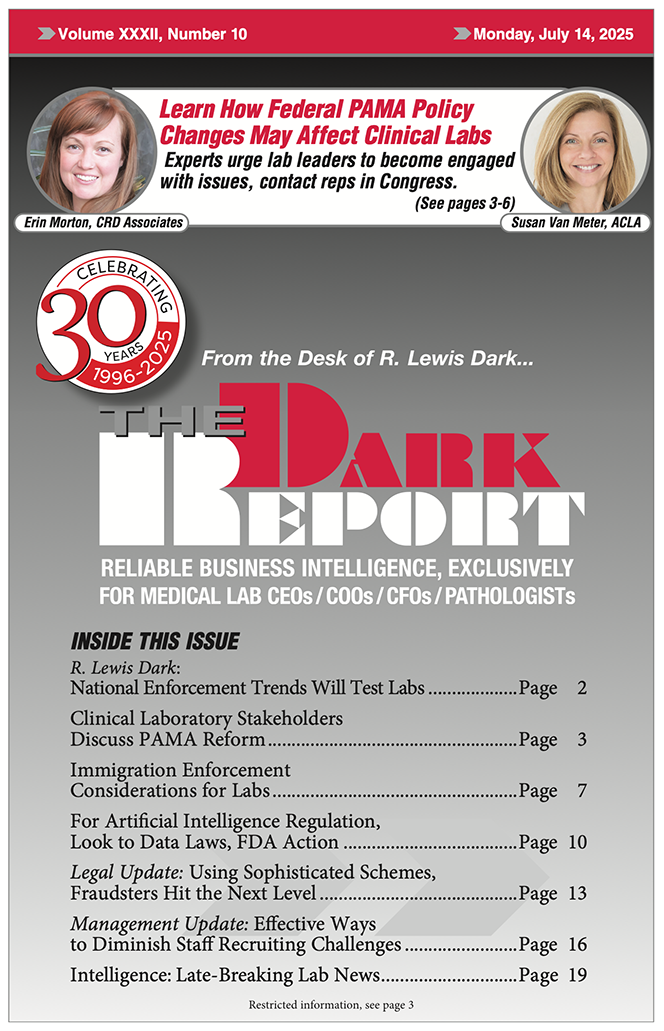Robert Michel
 Until Robert L. Michel came along and founded The Dark Intelligence Group (DIG) two decades ago, the clinical laboratory industry and the anatomic pathology profession lacked a trustworthy source for information about the management and operations of medical laboratories. From its inception in 1995, The Dark Report quickly became the “go to” source of industry intelligence, innovations in lab management, and strategic market analysis.
Until Robert L. Michel came along and founded The Dark Intelligence Group (DIG) two decades ago, the clinical laboratory industry and the anatomic pathology profession lacked a trustworthy source for information about the management and operations of medical laboratories. From its inception in 1995, The Dark Report quickly became the “go to” source of industry intelligence, innovations in lab management, and strategic market analysis.
This excellence in reporting has earned recognition from his peers. For example, twice Michel and The Dark Report have won national awards for best investigative reporting by the Specialty Information Publishers Association. In 2005, the award was for Michel’s coverage about how the anatomic pathology condominium laboratories (pod labs) operated by urologists and gastroenterologists came to be, who operated them, and how these owners marketed the AP condo labs to other physician groups. In 2009, Michel’s award for best investigative reporting resulted from his published interviews with Quest Diagnostics Incorporated when the company admitted that, for a period of 18 months, it had been reported inaccurate Vitamin 25(OH) D results because of problems with its laboratory-developed test methodology. The Dark Report’s story was picked up by The New York Times and was in the national news cycle for several days.
In his role as Editor-in-Chief, Michel brought unique capabilities to DIG and The Dark Report. His management training and diverse business experience—along with his skills as a concise writer and analyst—proved to be a winning combination for readers of The Dark Report. For that reason, Michel’s story has many intriguing elements.
Immediately prior to founding DIG, he had served in several executive positions for Nichols Institute based in Portland, Oregon, and San Juan Capistrano, California. This was during the time that Nichols Institute was an independent public lab company with annual revenues of about $280 million (prior to its acquisition by MetPath, Inc., now Quest Diagnostics Incorporated). He traveled extensively to many of the clinical lab business units owned by Nichols Institute in different regions of the United States and played a role in formulating effective market strategies in response to the emergence of closed-panel HMOs, capitated pricing, and full-risk managed care contracts, among other successful management initiatives.
Prior to his service at Nichols Institute, Michel served at three different Fortune 100 companies. These were Procter & Gamble, Centex Corporation, and Financial Corp. of America. Each was an opportunity to master new management techniques and apply them in different industries. Between these positions, he gained experience as an entrepreneur, having founded a real estate development firm and a general contracting company in the Southeastern United States.
Robert Michel earned a Bachelor of Arts degree in Economics at the University of California, Los Angeles, where he played rugby, a sport he participated in for another 22 years. He is a native of California and grew up in Santa Ana.
Articles by Robert Michel
When Does Cost Cutting Affect a Lab’s Quality?
CEO SUMMARY: Many lab professionals note the irony that a laboratory so publicly committed to Six Sigma quality management methods is now identified with the single largest episode of systemic failure in lab test accuracy. Looking in from the outside, some pathologists suggest th…
Laboratory Industry Has “Elephant in the Room”
CEO SUMMARY: In almost every laboratory across the United States and in several countries around the globe, one much-discussed topic in recent weeks has been the Vitamin D testing program deficiencies at Quest Diagnostics Incorporated. Yet, even as rank and file laboratorians act…
Quest’s Deficiencies Trigger QA/QC Questions
CEO SUMMARY: Experts in laboratory QA/QC and proficiency testing (PT) are following the news that Quest Diagnostics admitted to an 18-month problem with lab test accuracy in its home brew Vitamin 25(OH) D assay. It is recognized as a major failure in the existing system of labora…
Got a Lab Test Question? Call an ASCLS Lab Guru!
CEO SUMMARY: Each year since its launch in 2001, the ASCLS Consumer Response Team serves increasing numbers of patients and physicians. Clinical Laboratory Scientist volunteers from the American Society for Clinical Laboratory Science provide answers and help patients understand …
Staunch Laboratory Advocate Retires After 31 Years of Service
LAST MONTH, THE LABORATORY INDUSTRY lost one its most dedicated, full-time advocates. With his retirement in January, Joe Boone, Ph.D., ended a 31-year career with the Centers for Disease Control and Prevention (CDC). Boone started with the CDC in 1977. In 1992, he …
Denver’s UniPath Sells Its Histo Labs to APP
CEO SUMMARY: UniPath ended a long search for a business partner with ample capital and resources to help it continue its aggressive rates of growth in specimen volume, market share, and revenue. UniPath announced the sale of its technical laboratories to American Pathology Partne…
Did CMS Err in Issuing New Anti-Markup Rules?
CEO SUMMARY: In the latest anti-markup rules that took effect on January 1, CMS may have unintentionally stated that the anti-markup rule doesn’t apply when a pathologist is reviewing histology slides. While the rule itself is unclear, the commentary that accompanies the rule s…
February 02, 2009 “Intelligence: Late Breaking Lab News”
Last week, THE DARK REPORT was in Birmingham, England, to participate in the sixth annual Frontiers in Laboratory Medicine (FiLM) conference. This event is co-produced by the Association of Clinical Biochemistry (ACB) and THE DARK REPORT. It provides an opportunity to learn…
Lab Conserves Blood When Drawing Patients
From the Volume XVI No. 1 – January 12, 2009 Issue
CEO SUMMARY: New attention on both the risks associated with blood transfusions and the cost of blood products is triggering action by the nation’s hospitals. At the 719-bed Rhode Island Hospital, the laboratory is on the front line of the hospital’s blood management initiative. One c…
ASCP Awarded PEPFAR II Funds for Lab Assistance
From the Volume XVI No. 1 – January 12, 2009 Issue
CEO SUMMARY: With new Congressional authorization and funding of $48 billion, PEPFAR II—a second five-year initiative to help targeted countries battle HIV, AIDs, tuberculosis, and malaria—is about to get under way. To better support diagnosis and management of HIV/AIDs patie…
CURRENT ISSUE

Volume XXXII, No. 10 – July 14, 2025
This issue is strong on different flavors of enforcement that clinical laboratories, whether they want to or not, will need to contend with. Lab stakeholders provide insights that medical labs need to brace for more action to counter pending test reimbursement rate cuts under PAMA. Also, this issue provides the legal and regulatory landscape for clinical labs’ use of AI and how it evolves with the technology. AI is creating legal uncertainty for clinical labs, especially around data privacy and FDA oversight of AI tools in diagnostics.
See the full table of contentsHow Much Laboratory Business Intelligence Have You Missed?
Lab leaders rely on THE DARK REPORT for actionable intelligence on important developments in the business of laboratory testing. Maximize the money you make-and the money you keep! Best of all, it is released every three weeks!
Sign up for TDR Insider
Join the Dark Intelligence Group FREE and get TDR Insider FREE!
Never miss a single update on the issues that matter to you and your business.
Topics
- Anatomic Pathology
- Clinical Chemistry
- Clinical Laboratory
- Clinical Laboratory Trends
- Digital Pathology
- Genetic Testing
- In Vitro Diagnostics
- IVD/Lab Informatics
- Lab Intelligence
- Lab Marketplace
- Lab Risk & Compliance
- Laboratory Automation
- Laboratory Billing
- Laboratory Compliance
- Laboratory Equipment
- Laboratory Information Systems
- Laboratory Management
- Lean Six Sigma
- Managed Care Contracts
- Molecular Diagnostics
- Pathology Trends
- People
- Uncategorized

